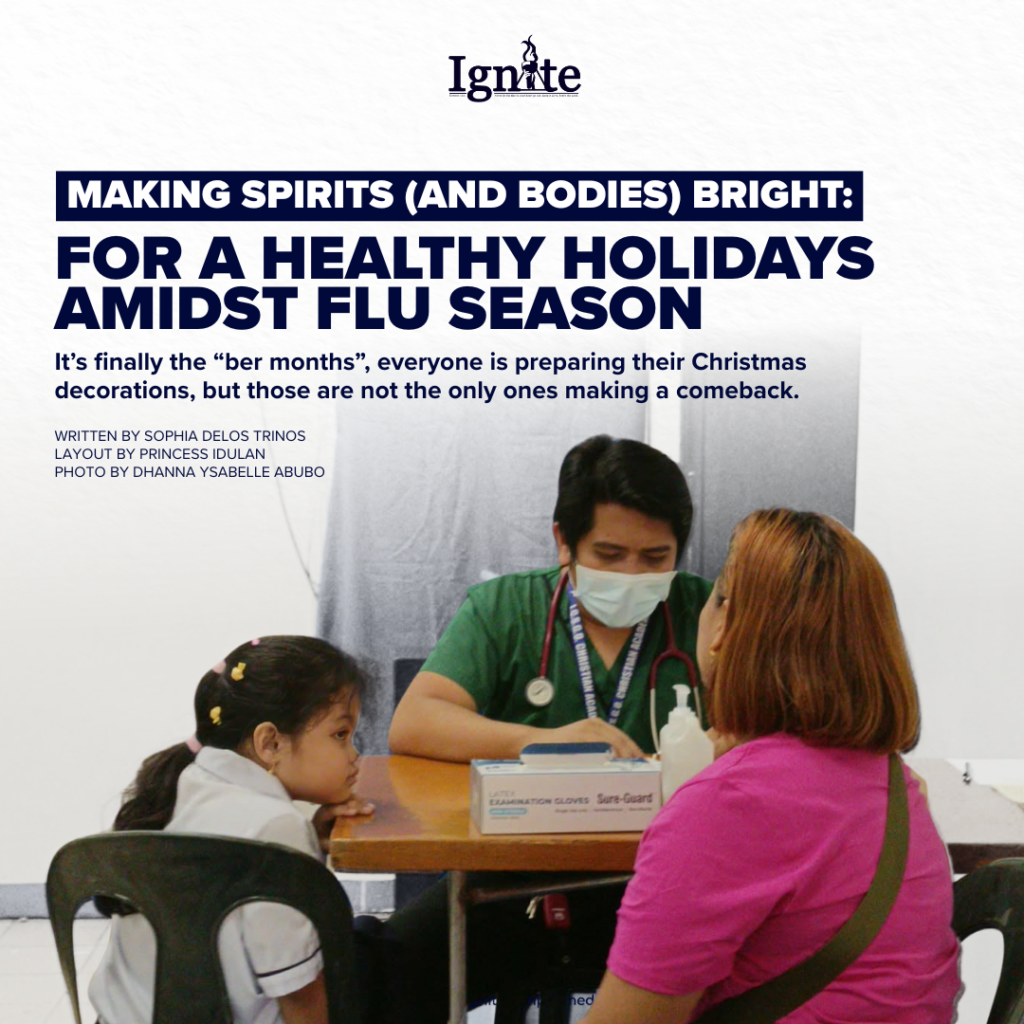
Making Spirits (and Bodies) Bright: For a healthy holidays amidst flu season
| Sophia Delos Trinos
It’s finally the “ber months”, everyone is preparing their Christmas decorations, but those are not the only ones making a comeback.
Influenza, commonly referred to as the “flu”, is a contagious respiratory illness affecting the nose, throat, and lungs. As people get into their Christmas spirits, so is flu season.
Do you think you might have the flu? Here are some Common Symptoms to check: Fever or chills, Cough, Sore Throat, Runny/Stuffy Nose, Body/Muscle Aches, Headaches, and Fatigue.
Who is most affected by the flu?
A Centers for Disease Control and Prevention (CDC) study found that children are most likely to get sick from the flu; however, people ages 65 and up are the least likely to be infected. Median incidence values of the flu were 9.3% for children 0-17 years old, 8.8% for adults 18-64 years old, and 3.9% for adults 65 years and older. This means that people from younger age groups are more than twice as likely to get the flu than those who are older.
The flu can last from a few days to two weeks. However, it can develop into far more serious complications like pneumonia, an inflammatory condition affecting the alveoli of the lungs, either from the flu directly affecting the lungs or weakening the immune system enough to let secondary bacterial infections grow and take hold of the lungs.
What’s the issue now?
Prior to the peak of flu cases, from January to September, 121,716 Influenza-like Illnesses (ILI) have been logged, an 8% drop from last year, which had 135,538 cases during the same period.
As of October 4, 2025, the Department of Health (DOH) reported a total of 127,749 ILI cases nationwide. Though it is not a cause for concern, as it is 6% lower than the previous year, with 136,421 cases reported.
Health spokesperson Assistant Secretary Albert Domingo also says that this is called the “seasonal flu” as the Northeast Monsoon arrives, more ILI cases do as well due to the cooler, drier weather and winds from the northeast.
Circulating rumors about a potential lockdown have also been debunked.
What steps have been taken to combat the rise in Flu cases?
Some schools have opted to switch to online learning to prevent more cases of flu in their respective schools. Students are also encouraged to use facemasks and observe social distancing to not further spread of the illness.
How do you avoid getting infected or spreading infection?
- Avoid close contact, especially with those who are sick. If you are the one who’s sick, avoid getting in contact with others. Maintain physical distance to lessen the spread of the flu.
- Stay home when you are sick. Since schools have opted for online learning, it gives students who are sick a better opportunity to get better. You can go back to school once you feel better overall and don’t take any medication. Afterwards, you should take extra precautionary actions to protect others.
- Cover your mouth and nose. When coughing or sneezing, droplets are made and are theorized to be the main reason for the infection of others. In order to avoid infecting others, wear a facemask.
- Clean your hands. Proper handwashing, or using alcohol, can protect you from germs. Additionally, avoid touching your eyes, nose, or mouth, as this can also be a reason you can get infected.
- Take steps for cleaner air, as this can reduce exposure to viruses.
- Practice good hygiene and other healthy habits. Clean your surroundings, especially frequently touched surfaces, like doorknobs. This can help prevent it from spreading. Improve your daily routine to practice habits like getting enough sleep, managing your stress, eating nutritious food, and other healthy habits.
Influenza is not something the citizens should turn a blind eye to, but neither is it something that should be something they fear. Through proper actions, initiatives, and habits, the spread of influenza and any other disease will lessen.
People should always remain vigilant, especially as Christmas draws closer and closer, leading to more interactions with others, which can become a reason to get infected.


